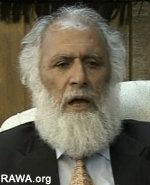By Terry Friel
KABUL - Afghanistan's attorney-general, accused by critics of regularly breaking the law, has raided Tolo television, one of the country's most popular stations, over a news item, the broadcaster said on Wednesday.
About 50 armed policemen raided Tolo's studio in an upmarket Kabul suburb on Tuesday night, assaulting staff and taking three senior journalists to the office of Attorney-General Abdul Jabar Sabet, Tolo said in a statement.

RAWA: Jabar Sabet, Afghanistan's attorney-general is a dark-minded person who has been a member of the Gulbuddin Hekmatyar terrorist band in the past.
The attorney-general's office could not be contacted and the Interior Ministry, which oversees his work, would not comment to Reuters but told local reporters Sabet had done nothing wrong.
Dozens of journalists and lawmakers protested on Wednesday outside parliament against the raid, accusing President Hamid Karzai's government of smothering freedom of speech.
The raid comes amid complaints, including by a group representing more than 100 aid agencies, that a new media law to be debated by parliament soon will restrict freedom of speech.
The United Nations mission in Afghanistan, UNAMA, condemned the raid and called for an investigation.
"(UNAMA) is greatly concerned about last night's police actions against Tolo TV and the accompanying manhandling and detaining of Tolo TV staff and other reporters covering the event," a U.N. spokesman said.
"Freedom of expression and of the press is guaranteed under the Afghan Constitution and is in line with Afghanistan's obligations under international human rights law."
Tolo accused Sabet of breaking the law and said it had investigated his complaint and found it baseless.
"The attorney-general, Abdul Jabar Sabet, had complained of a news clip on the 6 p.m. Tolo TV news, which he claimed was inaccurate or misrepresented (his) comments at an earlier press conference," Tolo said.
'GROUNDLESS COMPLAINT' - TOLO
"Tolo TV management found the complaint to be invalid. The Tolo TV news clip broadcast was accurate and representative of what the attorney-general had said."
Security camera footage and TV film of the raid which was not seized show police manhandling staff.
Four employees of The Associated Press who were observing the raid from outside were also detained. Several of the detainees were kicked or punched by police.
The raid on Tolo comes amid mounting reports of threats and physical abuse of journalists by government and military officials – chipping away at the media freedom that has been hailed as a success of Afghanistan's democracy since the ouster of Taliban regime in late 2001.capital, told IRIN.
"They were beating us with the butts and barrels of their AK-47s," Tolo administration manager Siddiq Ahmadzada told Reuters at Wednesday's rally. "They punched and kicked us."
Sabet has personally led raids on Kabul guesthouses and restaurants in which witnesses say police abused staff and stole alcohol and other goods.
At least 14 Tajiks and Nepalis were held for days before being charged with selling alcohol. Under Afghanistan's constitution, suspects must be charged within 24 hours or released, lawyers say. All 14 remain in jail.
The raids were ostensibly a crackdown on illegal alcohol sales, but witnesses say police drank seized alcohol. Sabet and his office have not answered questions about the accusations.
In those raids, neither Sabet nor the police produced documents authorising their actions, witnesses said. Tolo also said it was given no valid order for Tuesday night's raid.
Journalists covering the raid were detained as well and their tapes confiscated in what Barakzai and other members of parliament say was a breach of the media law and constitution.
The raids underline widespread criticism that the police, supposed to be a key weapon in the battle for security in the face of a mounting Taliban insurgency, are corrupt, badly trained and hold themselves above the laws they are charged to enforce.
Critics also point to parliamentarians accused of war crimes voting themselves an amnesty and note some villagers take disputes to Taliban parallel courts because they do not trust the government system.



